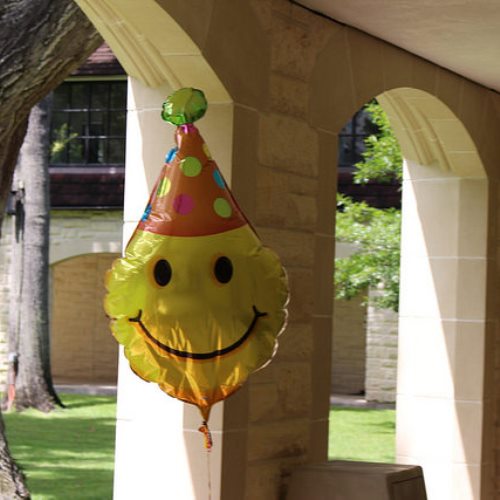Wellness initiatives catching up to student needs

Surprises like this smiley balloon hanging in the Quad remind students of the simple joys in life. Groups like Wellness Club try to ease the stress of students, improve their state of mind and encourage healthy habits.
November 4, 2014
The new Wellness Club promises to help students reduce stress, sleep well and ace school. Until recently, it seemed that the only way to accomplish all three of these things was to drop out of SJS.
Over the past few years, SJS has taken several measures to ensure the mental health of its students, including the appointment of Dr. Jennifer Welch as the Director of All-School Wellness in 2013. These measures are significant leaps from the previous method of stress management: being reminded that you go to SJS and that this is simply “what you signed up for.”
The Internet Age has helped lend a voice to students who would normally suffer in silence, and the rise of SJS Confessions in late 2012 played an important role in allowing students to be heard in an honest forum that was more effective than any Student Council suggestion box. The Facebook page provided an outlet for students and showed the realities of “#SJSlyfe” in a manner that could not be ignored.
That’s not to say that I believe the administration willfully turned a blind eye to our mental health, but as with individuals, the signs of stress, anxiety and other more serious mental conditions can be difficult to detect within an entire student body, especially with no outward symptoms of distress.
That being said, the signs of dangerous stress levels should have been dealt with a long time ago. Telltale signs showed in the bags under our eyes and the heavy backpacks slung over our shoulders. The now-defunct Nap Club was known for its famously low membership turnout in meetings, probably because students would rather have completed their homework during lunch than catch up on an hour of sleep.
The American Psychological Association reports that the average teenager experiences higher levels of stress than the average adult—5.8 versus 5.1 on a 10-point scale. Even worse, most teenagers reportedly underestimate the mental and physical consequences of their stress, and in these cases do nothing to alleviate it. Wellness Club’s responsibility should not only aim to reduce stress, but also to manage it in a healthful way.
The school may be taking a greater interest in students’ mental state, but the stigma of mental illness, often exacerbated if not caused directly by stress, remains prevalent in society and especially SJS, an institution intent on preserving a certain reputation. That reputation includes challenging students but not literally driving them crazy. The school probably reached the conclusion that, PR-wise, employing a policy of preventive care saves the headache of a more serious mental health-related situation that could stain the school’s prestigious reputation.
I may sound cynical, but the infamy of SJS’ workload has followed me since before I came here, and my personal experiences have done little to refute them. When I got accepted to SJS in sixth grade, my classmates at Annunciation Orthodox School, probably a little bit jealous, told me that I would get so much homework I would commit suicide. A sensational statement made from an eleven-year-old, yes, but at that time, SJS was still in the wake of a horrible mental-health related tragedy: the suicide of a ninth grade boy.
While I’m in no way insinuating that SJS was to blame for the tragedy, I’m disappointed that it has taken several years for serious mental health care reform to take shape. The suicide of Robin Williams in August sparked a national debate on the stereotype that depicts depression as something that can be easily detected—when really the disease can affect anyone for a number of reasons. Like most national debates, its focus fizzled as the media’s attention strayed elsewhere.
The Wellness Club is a step in the right direction, but as far as shedding light and handling mental health issues, both the school and society have a way to go.























